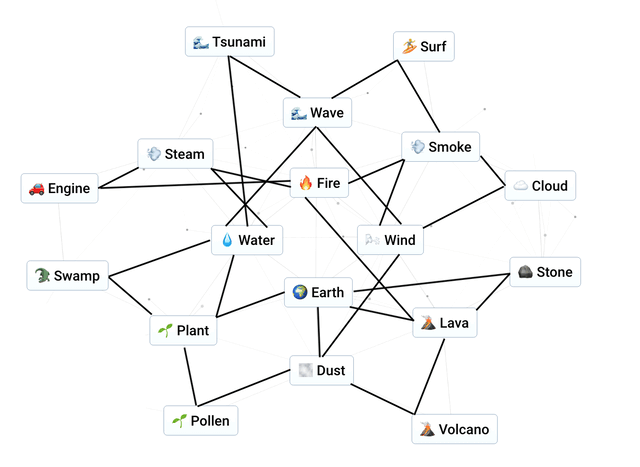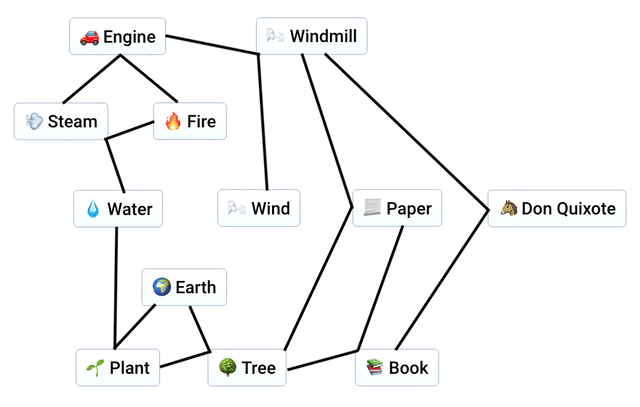Infinite Craft
I’m enjoying the heck out of Neal Agarwal’s web game Infinite Craft. This is a “crafting game” where you start with just four elements and repeatedly combine pairs of elements to create new elements — for example, Water plus Fire equals Steam. The clever gimmick is that instead of hard-coding a finite number of possible combinations, Infinite Craft’s backend (certainly looks as if it) simply asks an LLM what the result ought to be. So the combinations literally never run out.
Here’s a partial map of the starting elements’ neighborhood:

The game’s UI is quite different on mobile versus desktop; I like the mobile version much better.
It’s also easy to create your own UI for it, e.g. at the command line using Python requests to
hit the neal.fun/api/infinite-craft/pair API endpoint. (Out of respect for his backend, I’ll refrain
from posting the exact code. He’s got what looks like a proper rate-limiter, though.)
The cleverest part of the design is that the backend doesn’t go to the LLM every time; that would be expensive and slow. The backend (certainly looks as if it) keeps the entire history of the world in something like memcached. Every time you combine a pair, the backend looks to see if that pair has ever been combined before, and if so, it serves you the cached response. Only completely new pairings are sent to the LLM, and then the response cached for posterity. This means that the same pairing will give the same result every time, for every player. Cutely, this also allows the game to detect if you’ve just created a never-before-seen element! For example, everyone knows that Water plus Fire equals Steam, but maybe you’re the first person ever to see that Brunch plus Sandwich equals Sandbrunch. (Hey, it’s an LLM. They can’t all be winners.) So then the UI can display a little “First Discovery” flair on that element for you. Sadly, as of this writing the flair is shown only on desktop, not on mobile.
Infinite Craft is a sandbox game; but you can give yourself a goal, such as to create Math, or Potato, or Hamlet. (I’ve achieved Hamlet. Math and — surprisingly — Potato remain elusive.) Play competitively by racing to create an element in the shortest time, or with the smallest number of byproducts. Play on one device by taking turns à la pick-up sticks or Jenga: the first player to fail to create a new result on their turn loses. The possibilities, like the combinations, are endless!

Since the number of possible interactions grows quadratically with the number of elements you’ve already found, Infinite Craft reminds me of HyperRogue in that the number of positions reachable in \(n\) steps is counterintuitively large and the task of retracing one’s steps (say, to remember the recipe for Hamlet) is counterintuitively difficult.
